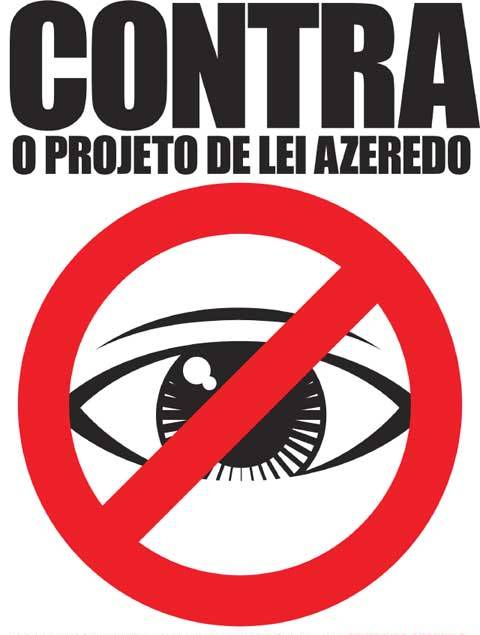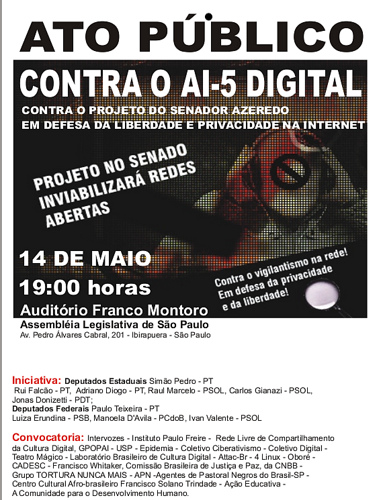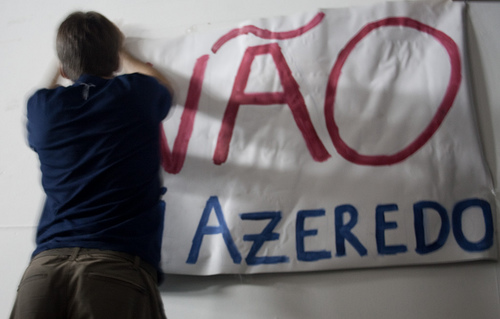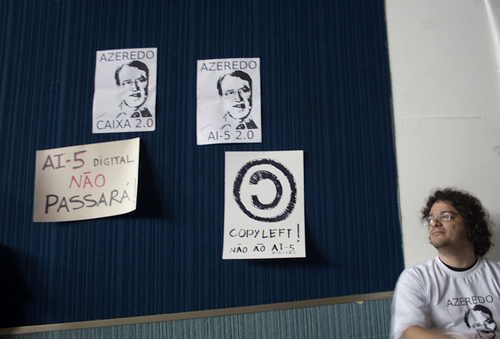On May 14th a protest [pt] against the Digital Crimes Bill proposed by Senator Azeredo to typify crimes on the Internet took place in São Paulo to promote debate. On May 25th, it was time for a demonstration in Porto Alegre. On June 1st, a similar protest happened in Minas Gerais and a new one is being planned now in Rio de Janeiro.
These protests have been called “Against the Digital AI-5” after the Brazilian dictatorship's Institutional Act Number Five or “AI-5“, the fifth, and considered the most cruel, of seventeen decrees issued by the military dictatorship in the years following the 1964 coup d'état in Brazil. Issued in 1968, AI-5 abolished freedom of expression by introducing the preliminary censorship of music, films, theater and television. Any work considered subversive to the political and moral values of the country was censored and artists jailed. AI-5 marked the transition to the toughest period of human rights violations in Brazilian history.
All over Brazil, mobilization against the proposed bill has been organized by a group of bloggers, who have put together a manifesto, a Twitter account and Mega Não! [Mega No!, pt], a blog created with the single purpose of gathering information and contributing to clarify what this bill might mean for Internet users in the country:
A proposta do Mega Não, é ser um meta manifesto, um agregador de informações e de diversas manifestações na Internet e fora dela, com o objetivo de combater o vigilantismo. Diversos núcleos ciberativistas estão surgindo e aumentando o discurso e a pressão popular contra o vigilantismo, tenta agregar, fomentar e ajudar a divulgar estes eventos é a nossa proposta, nos informe de seus movimentos, vamos juntar forças!!!
An online petition against the Digital Crimes Bill released back in 2008 has already gathered 146,627 signatures. Users of Orkut, one of the most popular online social networks in Brazil, have also entered this fight, since many of the demands of this bill are related to this specific social network. One of many related communities, “Não ao projeto de Azeredo” [No to the Azeredo Bill, pt], has already attracted 6,563 members.
Activists are also using Twitter as an informative tool for their meetings and collaborative blogging about the subject: the hashtags #meganao and #ai5digital are usually used by bloggers and tweeters and represent a source of information for those seeking updates on how to contribute to the campaign. In addition to this, many of the demonstrations’ organizers, supporters and enthusiasts can also be found on Twitter, such as @caribe, @pauloteixeira13, @samadeu, @arlesophia and @myris. To keep track with all the details on the repercussions of the demonstrations and the Azeredo Bill itself, people are also using Delicious tagged bookmarks to gather information in one place.
Another interesting fact is that mainstream media has not been covering this situation satisfactorily. For many Brazilian bloggers and Internet users, it looks like the media outlets, in addition to Internet companies and the government, are willing to see the bill approved, so that they will have control over what people say and do all over the Web. Antonio Arles (@arlesophia) comments on this in his blog [pt] and stresses how the Internet is useful to gather information about the demonstrations:
Participei (presencialmente ou via Internet) de pelo menos três atos este ano em que a Rede foi importante para a organização, difusão e transmissão: o Ato contra a “Ditabranda” da Folha, o Saia Gilmar e o Ato Contra o AI-5 Digital. E é justamente essa possibilidade de exercício da cidadania um dos motivos da adesão dos oligopólios midiáticos ao AI-5 Digital. A lógica é a mesma da dos órgãos de repressão do Império Soviético ou da Ditadura Civil-Militar Brasileira. Apesar de usaram a máscara de “democratas” – usando argumentos como o da liberdade quando seus interesses estão em jogo, tentando confundir “liberdade de imprensa” com “liberdade da empresa” -, os oligopólios midiáticos são fruto de uma ditadura. Em última análise, são uma das faces da Ditadura Civil-Militar que continuam vivas depois da redemocratização. A questão é que, para além dos interesses econômicos, a tentativa de criminalização e de aprofundar vigilantismo na Internet é uma tentativa de manutenção do monopólio da informação/opinião e, conseqüentemente, do poder.
Whether this bill will be passed or not, it seems that the main aim of the Brazilian authorities is to indulge international copyright companies. In an interview for the Observatório do Direito à Comunicação blog [Observatory of the Right for Communication, pt] Paulo Teixeira, a PT [Labour Party] member of parliament for São Paulo, stresses:
Ele pretende (o Projeto de Lei Azeredo), em primeiro lugar, introduzir no Brasil uma coisa que alguns países estão introduzindo e que no Brasil, na minha opinião, nós não deveríamos permitir que se introduzisse. Ele está querendo introduzir os mecanismos de controle da internet para a garantia do direito autoral.

Signs read "Against the Azeredo Law Project" by @marioamaya
The Digital Crimes Bill has been discussed in several previous posts on Global Voices Online. Now it is up to activists, cyberactivists and Internet users to fight against the Digital Crimes Bill with even more strength. Otherwise, the Brazilian Internet might be turned into a place where people are guilty before they have even realized what they are being charged with.










11 comments